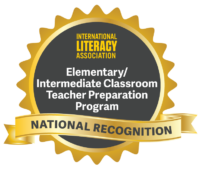
Curriculum and Instruction
-
Skills for outside the classroom.
Prepare for administrative careers in education that take you outside the classroom.
-
Join the tradition.
For nearly a century, Notre Dame College has been known for its academic excellence.
-
Learn on your time.
Our online learning platform allows you to choose when and where you study.
-
Overview
Your key to advanced career opportunities in education.
Are you ready to improve your career? The online master’s in curriculum and instruction program from Notre Dame College can transform your skillset and help you land a rewarding education career outside of the classroom.
Whether you are a working teacher seeking a master’s degree or a professional in a non-education field striving for a career change, the curriculum and instruction master’s degree will elevate your potential and help you accomplish your professional goals. Through our interactive online classroom, you will explore innovative topics in education, receive support from experienced educators and learn on your schedule.
Recognizing the sacrifice that Catholic school teachers and staff make, Notre Dame College offers teachers, staff, and administrators at Catholic schools and Catholic institutions an automatic 20% discount on tuition at Notre Dame College.
Topics of Study
When you complete the online curriculum and instruction master’s degree, you will have the professional skills to:
- Design curricula for K-12 classrooms
- Innovate new educational resources and programs for both teachers and students
- Understand an extensive history of education
- Professionally evaluate new educational programs
- Utilize new technologies to program digital teaching tools
Many graduates of our online master’s in curriculum and instruction program will pursue administrative careers in education. Many of these career paths lead to positions outside of the classroom and involve curriculum design and programming. Some graduates even go on to pursue doctoral degrees.
While completing the program, you will receive personalized attention from our faculty of experienced educators who are committed to your success. They deliver unparalleled academic support to ensure you excel in your courses and finish your curriculum and instruction master’s degree with the professional skills and expertise required for a rewarding career.
Created for working individuals, the online master’s in curriculum and instruction program can be completed in our interactive online classroom. You will receive flexible schedule options that allow you to access your courses at the time and place of your choice.
This Program Is Designed for:
- Working teachers seeking education career opportunities outside the classroom
- Educators looking to design curriculum and evaluate new programs
- Educators who need a master’s degree for career advancement within their institution
- Adults striving to earn a master’s degree while maintaining their personal schedules
- Professionals in non-education fields who want to change their careers
Why Notre Dame College
Located in South Euclid, Ohio, Notre Dame College is a small yet vibrant liberal arts Catholic college. We are committed to offering world-class learning both on campus and online with student success as our top priority. Our reputation for excellence is rooted in our variety of degree programs, expert instructors and continuous support of our students. Whether you learn on campus in Ohio or in one of our flexible online degree programs, you’ll experience the exceptional education Notre Dame College is known for.
 Notre Dame College’s Elementary/Intermediate Classroom Teacher Programs have been nationally recognized by the ILA (International Literacy Association) for the Preparation of Literacy Professionals.
Notre Dame College’s Elementary/Intermediate Classroom Teacher Programs have been nationally recognized by the ILA (International Literacy Association) for the Preparation of Literacy Professionals. -
Courses & Requirements
Your course of study will provide you with the skills needed for the education career you want. Our online curriculum and instruction master’s degree program requires 30 credit hours.
Master’s Core
Course Description Credits ED 501 This research course focuses on technology integration, research studies and assessment of the effectiveness of technology integration in the classroom. It assumes the graduate candidate has basic computer literacy. The course is delivered on three levels: (1) Research: graduate candidates research effective methodology and pedagogy in technology integration, (2) Technical: graduate candidates explore emerging technologies (which include assistive technologies) and their relevance to academic content and a diverse student population and (3) Design, Preparation and Assessment: graduate candidates apply a variety of design models to create and assess a learning environment enhanced by technology.3 ED 503 This course introduces the historical and social forces that shape American education as well as the political and economic conditions underlying modern schooling; examines the Ohio Standards for Teachers and the Code of Professional Conduct; considers the spectrum of contemporary thought and controversy that has influenced the character of American education; and explores the nature of diverse schools, school choice and the “new segregation”.3 ED 504 This course provides a study of learning principles and theories from several perspectives: the physiological basis of thinking and learning, behaviorism, social cognition, learning and memory, developmental stages of cognition and motivation. Graduate candidates will use these perspectives as lenses through which to evaluate and implement teaching and learning practices.3 ED 506 This course introduces the fundamentals of educational research. Topics include the nature of scientific investigation, ethical considerations in human subject research, quantitative and qualitative research methodology and their respective philosophies and appropriate data analysis techniques for different research designs. Graduate candidates learn to analyze and interpret published research reports in order to become better consumers of research.3 Content Specialization
Course Description Credits ED 629 This course will familiarize students with selected topics that have influenced education system development and reform in the United States. Topics include the role of schooling in social mobility, the experience of racial and ethnic minorities in schooling, and ideological and curricular movements over time.3 ED 634 This course will offer candidates foundational knowledge and practice in developing curricula for K-12 schools that meet standards for 21st century learning. Research in curriculum trends, theories, and structures will be examined. A portion of the course will be devoted to curriculum design in online environments as well.3 ED 637 This course is designed to provide candidates in the Curriculum and Instruction track with the theoretical and practical background knowledge and analytical skills necessary to make evidence-based decisions using classroom/program data sets. The goal is to learn how to see educational data analysis is a means by which student learning and professional teaching can be continuously and simultaneously analyzed and improved. This is especially important when considering appropriate differentiation strategies for students with a range of gifts, talents and challenges in their learning. Assessment choices and the collaboration/communication strategies to explain those choices to educational partnerships (administrators, parents, community members) will also be emphasized.3 ED 638 This course will familiarize students with techniques necessary to complete a comprehensive curriculum evaluation plan. These skills include curriculum planning, development, implementation, and evaluation and reform. Special attention will be given to addressing program development in multicultural learning settings.3 Select One:
Course Description Credits ED 670 This capstone is designed for candidates who are currently teaching or in a professional capacity in which an Action Research project can be implemented for a period of four weeks. Candidates identify a content or classroom/ student management area for study that adds to or improves their teaching practice. Candidates use 20 sources of archival research that informs the methodology. The methodology is implemented over a four- week period and data is collected on its impact. A public presentation of the project is scheduled at the end of the semester.6 ED 671 Although this capstone is intended for all candidates, its design will accommodate candidates who are either not currently teaching or not sufficiently familiar with the 40 instructional and programmatic regularities of an educational site where they can develop a proposal that includes active data collection for a sustained period of eight to 10 weeks. Candidates will identify a topic for study that is of interest and importance to their practice. Methodology will focus on incorporating primary data sources. Hence, in addition to archival sources, candidates are required to use three forms of multimedia [e.g. documentary, videotape, DVD, radio and/or television interviews]; three in-person interviews consisting of at least 10 faculty-approved questions and two observations using a faculty-approved observation protocol. Data is gathered, analyzed and reported. A public presentation of the project is scheduled at the end of the semester.6 ED 674 6
Admission Requirements
Students applying for admission to the online master’s in curriculum and instruction program must meet the following requirements:
- A bachelor’s degree from a regionally accredited university
- A minimum 3.0 GPA*
*Applicants with a lower GPA may be provisionally accepted.
How to Apply
Students applying for admission to the online master’s in curriculum and instruction program must submit the following materials:
- A complete online application
- Official transcripts from your degree granting institution
- Two professional letters of recommendation
-
Costs & Financial Aid
Notre Dame College Online features a high-quality education at a price you can afford. See how your past academic credentials can help you make the most of your college education.
Component Requirements Cost Per Credit Hour Total Tuition 30 credit hours $630 $18,900 Transfer Credits 6 credit hours $630 $3,780 Total with transfer credits (up to 6) $15,120 Financial Aid
Discover federal financial aid, U.S. military benefits and other ways to make your education affordable.
Military Students
Notre Dame College is proud to be recognized as a Military Friendly School and participant in the Yellow Ribbon Program. Learn more about how Notre Dame College Online seeks to help service members make the most of their education.
-
Outcomes & Resources
Careers
Learn more about potential careers available after you graduate. Some include:
- Catholic education systems
- Curriculum design
- Programming
- Public districts
Benefits of Learning Online
Learn more about how online learning can provide you with a flexible and convenient way to earn your degree and go further as a professional.
View Benefits -
Frequently Asked Questions
Online students are exceptionally self-motivated. They demonstrate determination, discipline and a willingness to fulfill their commitments. Be prepared to devote a significant amount of time each week to your classes. Engage in discussion, meet your deadlines and communicate with your advisor if you have questions or concerns. These habits will help you move successfully through our programs.
Yes! Notre Dame College Online recognizes the importance of an affordable education, and we strive to ensure your financial situation is not a boundary when it comes to your career success. Refer to our Financial Aid page to learn more about how to pay for your degree.
The Free Application for Free Student Aid determines your eligibility for financial aid programs, such as loans and grants. It helps identify the types of aid you may receive, such as federal and state grants, work study programs and low interest loans. We strongly recommend you fill out your FAFSA form each year to help identify which financial aid opportunities may be available to you.